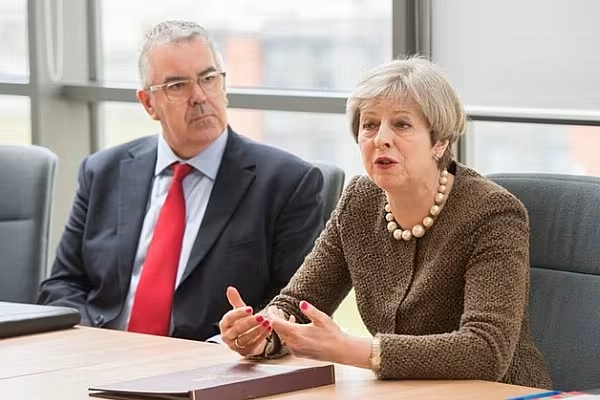The U.K. will start the clock on two years of negotiations to withdraw from the European Union on Wednesday, a divorce that will redefine the country’s relationship with its largest trading partner and bring to an end decades of deepening political integration on the continent.
The ties that have bound the U.K. to the EU since 1973 will start to unravel at around 1:30 p.m. in Brussels when Britain’s ambassador hands EU President Donald Tusk a hand-signed letter from Prime Minister Theresa May invoking Article 50 of the Lisbon Treaty, the legal exit mechanism. May will address lawmakers in London at about the same time.
Nine months since Britons unexpectedly voted to leave, the phony war of what Brexit might look like will turn into a real battle over the complex terms of a settlement with 27 other governments. Enough lines over money, trade and immigration have been drawn to suggest a tough process with costs to both sides.
“We’re moving from a U.K. monologue to a hard negotiation,” said Gregor Irwin, chief economist at Global Counsel, a consultancy, and a former official in the U.K. Foreign Office. “There are going to be many upsets along the way.”
‘Global Britain’
The pound on Wednesday weakened against all of its Group-of-10 peers and fell to a one-week low against the dollar. It has fallen 17 percent since the referendum although it stabilized recently as investors awaited signs of how the talks would progress.
May is aiming by March 29, 2019, to have won back control of labor flows and lawmaking, while also landing a new free trade pact with the bloc. The EU is demanding the U.K. first pay a 50 billion-pound ($63 billion) fee and there is the threat of sweeping tariffs being imposed if a deal isn’t struck in time.
“It is my fierce determination to get the right deal for every single person in this country,” May will tell parliament, according to her office. “We all want to live in a truly global Britain that gets out and builds relationships with old friends and new allies around the world.”
In the background is London’s future as an international financial hub and threats by banks to up sticks. There’s also Britain’s commercial relations with the rest of the world and even the potential breakup of the U.K. as Scottish nationalists use Brexit in their push for autonomy. The legislature in Edinburgh voted on Tuesday to pursue another independence referendum.
Divided Country
The talks will test the negotiating mettle of a premier in power for just eight months and her ability to play to a domestic audience, especially the anti-EU wing of her Conservative Party that remembers she voted to stay in the bloc. Britain is divided over a “hard Brexit,” where May could walk away with no deal, and “soft Brexit” with continued tariff-free trade, which Scotland and other pro-EU factions want.
Read more about what kind of trade agreements the U.K. hopes to strike
May interpreted June’s referendum result as a protest against some of the key tenets of globalization, a trend that also swept Donald Trump to power in the U.S. and put National Front leader Marine Le Pen ahead in some polls before French presidential elections next month.
For Europe, it’s a question of cohesion. Any deal struck between the U.K. and the EU potentially could decide whether Britain proves to be a trailblazer for other countries to leave, or remain the skeptical outlier it has always been. To ward against encouraging others to eye the exit door, EU officials say Britain will not be allowed to enjoy better terms outside the bloc than inside it.
Both sides talk publicly of the need to avoid hostilities, with May speaking of a “new deep and special partnership” on the eve of the trigger. She also telephoned Tusk, German Chancellor Angela Merkel and European Commission President Jean-Claude Juncker, agreeing with all of them that “a strong EU was in everyone’s interests and that the U.K. would remain a close and committed ally,” according to her office.
Still, Juncker has in the past predicted negotiations will be “very, very, very difficult.” David Davis, the Brexit czar, is preparing for what “may be the most complicated negotiation of all time.”
May wants to leave the EU’s single market to reduce the number of people allowed into Britain to work. She also wants to escape the oversight of the European Court of Justice and cease sending what she calls “vast” sums of money to Brussels.
As for trade, she is requesting the “best possible deal,” while at the same time winning the freedom to line up trade accords with countries such as the U.S. and China.
News by Bloomberg, edited by ESM. To subscribe to ESM: The European Supermarket Magazine, click here.













